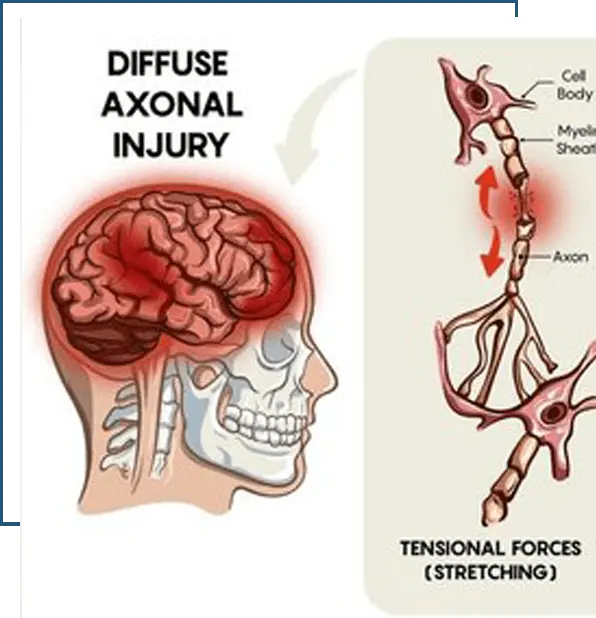
Baxley Maniscalco Attorneys At Law
A diffuse axonal injury (DAI) is a type of brain injury that occurs when the brain is subjected to rapid acceleration or deceleration, such as in a car accident or a fall. A DAI can cause widespread damage to the brain's axons, which are the long, thin nerve fibers that transmit signals between neurons.
Symptoms of a DAI can vary depending on the specific location and severity of the injury, but may include:
1. Coma or altered consciousness: A DAI can cause a coma or altered level of consciousness, ranging from a deep coma to a state of confusion or disorientation.
2. Neurological deficits: A DAI may cause a range of neurological deficits, such as weakness or paralysis on one side of the body, loss of sensation, or difficulty speaking or swallowing.
3. Cognitive and behavioral changes: A DAI may cause cognitive and behavioral changes, such as memory loss, difficulty with decision-making, or changes in personality.
How Will a DAI Be Diagnosed?
A DAI can be a severe and potentially life-threatening injury and may require extensive medical treatment and rehabilitation. The prognosis for a DAI can vary depending on the specific location and severity of the injury, as well as the patient's age and overall health.
A DAI can be difficult to diagnose due to the diffuse nature of the injury and may require advanced imaging techniques such as MRI or CT to confirm the diagnosis. It is important to seek medical attention as soon as possible after a head injury to maximize the chances of a successful recovery.
Common Treatment Methods for DAI
The treatment of a DAI may include a combination of medical and rehabilitation interventions to manage the symptoms and promote recovery.
Some common treatments for a DAI may include:
- Medical management: Medical management may involve the use of medications to control seizures, reduce swelling, or manage other symptoms of the injury.
- Surgery: Surgery may be used in some cases to remove blood clots or to repair structural damage to the brain.
- Rehabilitation: Rehabilitation is an important part of the treatment of a DAI and may involve a variety of therapies and interventions, such as physical therapy, occupational therapy, speech therapy, and cognitive-behavioral therapy. Rehabilitation can help the patient to regain function and independence.
Supportive care may include measures to manage complications of the injury, such as pneumonia or pressure ulcers, and to provide nutrition and hydration to the patient.
Controlling Seizures Resulting From a DAI
Seizures are sudden, abnormal electrical discharges in the brain that can cause muscle spasms and changes in consciousness. Seizures can be caused by a variety of factors, including brain injuries, epilepsy, and other medical conditions.
Several types of medications may be used to control seizures, including:
1. Anti-Epileptic Drugs (AEDs)
AEDs are a type of medication that is commonly used to treat epilepsy and other seizure disorders. AEDs work by inhibiting the abnormal electrical activity in the brain that causes seizures. Some common AEDs include:
-
Phenytoin (Dilantin)
-
Valproate (Depakene)
-
Lamotrigine (Lamictal)
-
Levetiracetam (Keppra)
2. Benzodiazepines
Benzodiazepines are a class of medications that are commonly used to treat anxiety, insomnia, and other conditions. They can also be used to control seizures in some cases. Some common benzodiazepines include:
-
Diazepam (Valium)
-
Lorazepam (Ativan)
-
Clonazepam (Klonopin)
3. Barbiturates
Barbiturates are a class of medications that are commonly used to treat anxiety and insomnia. They can also be used to control seizures in some cases. Some common barbiturates include:
-
Phenobarbital
-
Secobarbital (Seconal)
Never Settle Cheaply
Properly navigating the world of brain injuries in conjunction with injury cases requires experienced legal expertise at your side.
Baxley Maniscalco stands ready to provide you with personalized, evidence-based approaches to your case tailored to your specific needs.
Contact us today for a free and confidential consultation.
